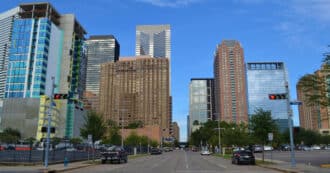By Faygle Train
Virginia is being hit hard by climate change. The Barrier Islands along Virginia’s Atlantic coast are experiencing sea-level rise, leading 260,000 people to be at risk of in-land flooding. Summers are getting much hotter and muggier, putting 160,000 vulnerable Virginians, like children and the elderly, at risk of heat-related health complications. This heat is even lengthening mosquito season!
It’s time to fight for Virginia’s future – and faith leaders and schools are up to the task.
Eastern Mennonite Seminary in Harrisonburg is one school committed to sustainable change. They have a climate action plan to achieve carbon-neutrality by the year 2035, and to achieve this goal, they have filled their campus with LEED-certified residence halls and the first commercial scale solar installation in Virginia. Students can take a class on Environmental Ethics, about Anabaptist perspectives on sustainability. Retired professor Dr. Dorothy Jean Weaver recently taught a course on Creation Care in Scripture and Church, about practical applications of the Biblical command to be a steward of God’s gift, earth. There is even a Graduate-level class on Biomedicine, Faith and Ethics with Dr. Roman Miller.
Also housed on the Eastern Mennonite University campus, where EMS is the graduate theological institute, is the Center for Sustainable Climate Solutions. It actively engages Anabaptist and other church communities on climate issues.
In Richmond, Union Presbyterian Seminary students can engage in climate issues from a variety of perspectives. They can volunteer on 5 acres of campus land cultivated by Shalom Farms, a local NGO dedicated to promoting food justice through healthy food and healthy lives. Students can also attend workshops led by Dr. Frances Taylor Gench. Her workshop on Reading the Gospel of John Ecologically is a great option for those who cannot take her full course, The Bible from the Underside, in which she hosts an Ecological Readings week. By reading voices from both the US and around the globe – including readings from environmental and religious scholars like Ellen Davis, Barbara Rossing, Richard Bauckham, David Rhoads, and Norman Wirzba – students can better develop an understanding of nature and religion.
For those who like to curl up with a good book, there are also UPSem options! Dr. Henry Simmons, now retired, helped co-write Ecotheology and the Practice of Hope, about religious views of the natural world and our relationship to it. Students can also read one of two books written by professor Dr. Paul Galbreath, both of which deal with ecological and spiritual themes: Leading into the World and Re-Forming the Liturgy. He now teaches on the Charlotte campus of UPSem.
Seminaries are not the only saviors. In Reston, you can visit Northern Virginia Hebrew Congregation, a synagogue with a Green Team for a sustainable future. They are working to reduce their community’s carbon footprint.
Virginian faith leaders are preaching for the planet. Isn’t it time we joined them?





